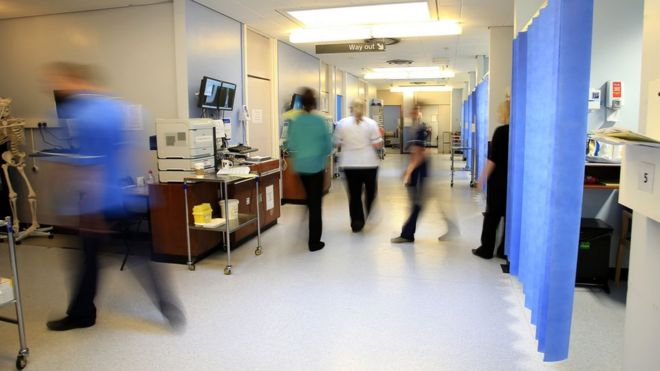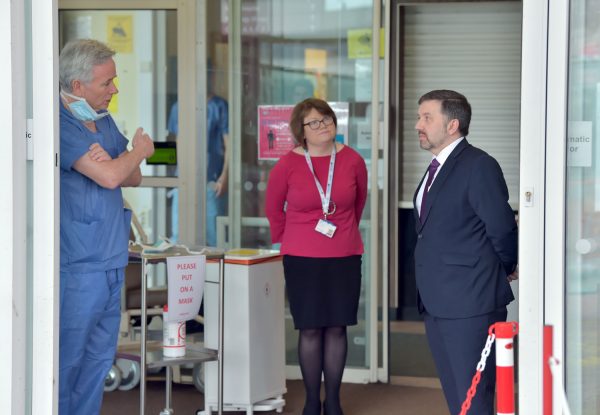 LENGHTY hospital waiting lists in the North of Ireland are to be banished by March 2026, according to a roadmap set out by Health Minister Robin Swann.
LENGHTY hospital waiting lists in the North of Ireland are to be banished by March 2026, according to a roadmap set out by Health Minister Robin Swann.
More than 330,000 people are on some form of hospital waiting list here.
The new elective care framework proposes a £700 million investment over five years.
It sets out a twin-track approach of investment and reform to ensure that “backlogs do not keep re-occurring”.
“The time for talk is over. What we need now is concerted action,” Mr Swann said.
The plan, ambitious in itself, also has to build in dealing with Covid-19.
In order to do that, it proposes to implement “green pathways” which will keep elected care services entirely separate from any exposure to Covid-19.
It will also see emergency departments kept separate as much as possible from planned surgical hubs.
That means operations for the likes of hips, knees, cataracts and varicose veins can be performed on sites at speed and uninterrupted in order to cut through the waiting lists.
Other aspects of the plan include:
Surgeries in ring-fenced specialist hubs
A regional NI-wide approach as opposed to a disjointed postcode lottery system
Mega clinics for outpatient, assessment and pre-operative assessment clinics
Ongoing cooperation with the independent sector
Improved data, reporting and accountability
The framework sets a target of March 2026 for no patient waiting more than 52 weeks for a first outpatient appointment and inpatient day case treatment, or 26 weeks for a diagnostics appointment.
Mr Swann said that if the timeline could be brought forward it would, but he said he had to “acknowledge the scale of the problem that has built up and the capacity restrictions that will limit room for manoeuvre”.

Health Minister Robin Swann meets Dr Tom Black of the BMA in March last year at Altnagelvin Hospital over Coronavirus screening
“This is almost five times as many as when the abortive 2017 Elective Care Plan was published.”
It is also proposed that cash incentives should be offered to staff in areas where waiting lists are more acute, although the plan does not specify whether this includes nurses, surgeons or both.
This could, however, create problems for health unions and would require negotiation.
The Cross-Border Healthcare Directive is to be reinstated for a 12-month period from July 2021.
This reimbursement scheme allows patients to seek and pay for routinely commissioned treatment in the private sector of the Republic of Ireland while having the cost of the treatment reimbursed.
A similar plan, the Elective Care Plan, was published in 2017, however the Stormont Executive collapsed just three weeks later.
The big differences in the 2021 plan are that waiting numbers have increased and the service is also dealing with the pandemic.
The waiting lists plan does not go as far as highlighting where surgical hubs will be based, or how services will be re-jigged on sites – that is when even tougher and more politically sensitive decisions will have to be taken.
The plan distinguishes between immediate, medium and longer-term actions.
For instance, from next month the health service will introduce enhanced rates of pay for staff working in “targeted shifts and delivering priority elective activity”.
Also by September “mega clinics” will be in place for orthopaedic outpatients, cataract assessments and for a range of pre-operative assessments.
Some of these clinics will require patients having to travel slightly further than they otherwise would have, but the plan states this should reduce the time waiting to be seen.
By next March, it is hoped detailed proposals will be in place for how the service can provide a rapid diagnostic centre.
Long-term goals include moving towards a seven-day working week for hospital theatres.
And, to mirror how waiting times are measured across the rest of the UK, Northern Ireland will become more “transparent” in how it measures the length of time a person has to wait, for instance from when patients actually see their GP with a medical complaint.
The health minister described the launch of the plan as a “staging post” in the “long struggle” to turn the health service around.
He also said it is fundamental “to restore hope to all those languishing on waiting lists”.
Tags:




